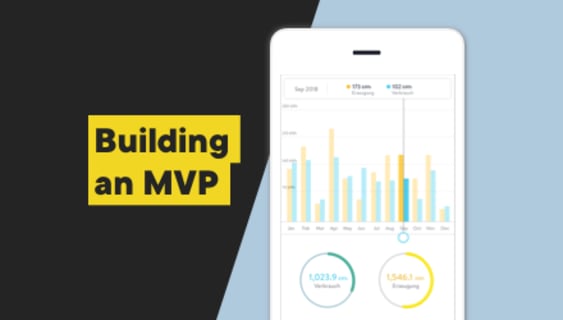Software development in Germany - costs, challenges, and chances
When you think of Germany, what comes to mind? I am thinking BMW (which I am a massive fan of), Mercedes-Benz, Siemens… What do these brands have in common? They stand for high quality. The 50 most respected German brands, i.e. brands which have the highest corporate value (measured in financial and non-financial terms) have a combined equity of €263 billion, which puts Germany ahead of France and the UK.

Table of contents
Most of us associate Germany with high-quality products which makes the German market particularly demanding. This also relates to software development. Software development in Germany, just like in the rest of Europe, constitutes a challenge due to its time-consuming nature and a deficiency of experienced software developers.
Germany is considered the biggest market for software development and therefore needs reliable software partners to help it fulfill their needs to the highest standards.
Software development in Germany - what are the challenges?
High potential creates high expectations and competition
Germany’s software development market continues to be in a state of robust growth. As the biggest software market in Europe, it represents approximately 25% of the total European market, outpacing both Ireland and Italy (second and third place, respectively: source). Expectations are for the German software development market to experience an annual growth rate of 4.16% from 2023 to 2028. However, with great potential also comes heightened competition.
Even though companies such as IBM, Oracle, and SAP are important players, the market is dominated by highly specialized SMEs which also drive significant demand and create a promising customer base. This leads to two challenges:
- High customer expectations - since there is a lot of product variety, customers can afford to be picky, and they don’t have to compromise on quality. Since German brands strive for excellence, they will only cooperate with software development partners who can fulfill their high demands.
- Talent competition - Germany, just like most markets worldwide, suffers from a lack of skilled software engineers. In fact, current estimates show the shortage of tech talent in Germany growing 12% year on year. The more software companies on the market, the wider the choice for potential employers of software developers, which might prove problematic. To further show the limited availability of tech talent in the country, the most recent MINT report (Mathematik Informatik Naturwissenschaft und Technik; in English, STEM: science, technology, engineering, and mathematics) showed just over 180,000 STEM job seekers for nearly half a million vacancies – a shortfall of 320,000+.
Skill shortages
While overall, the German labor market’s record-low unemployment rate continues to fall, especially for programmers, there are significant skill shortages in the engineering space. Especially in sciences, engineering, and software development. Knowing how competitive the German market is, filling the recruitment gap is going to be difficult. According to Prognos, by 2030 as many as three million skilled workers might be missing in various industries.
Lack of talent pool limits investment
Not having enough talent available might seriously impede investment. Competition between European cities is fierce, they all fight for the interest of startup founders. One of the key factors which investors and founders take into account while deciding where to set up a business is talent accessibility. Europe is an attractive hub for software developers with over 6 million professional developers working in Europe.
Germany and the UK are home to the most significant number of software developers, i.e. over 1.7 million. However, since Germany is the biggest software market, this number is less impressive than it initially appears. For Germany to remain the A-player in the software industry and to attract a large pool of investment, it has to find a way to maintain a continuous flow of talent. It’s not mission impossible! We will discuss how it can be achieved later in this article.
To outsource or not to outsource?
To be honest, if you already have an in-house development team that is capable of providing the highest quality, then you don’t need outsourcing.
On the other hand, if you feel that hiring new people, or investing in new skills for your in-house team might be overwhelming for your budget, you should think about working with external partners.
Cost of software development in Germany
Software development cost estimations should consider the following factors:
Salaries of the dev team
Building software is not a cheap endeavor! You can’t build software without building a development team first. Devs’ salaries constitute the biggest cost component. If you were to hire a programmer in Berlin, expect to pay them an average of €51,203 annually. If your team was made up of just four developers, that’s over €200,000 a year. And that’s only software engineers. Ideally, your team should include quality assurance specialists, project managers or scrum masters, UI and UX designers, etc.
The time it takes to build a high-performing software team
Companies in almost every industry rely on programmers, which makes recruiting them even harder. Of employers, 86% of employers claim that hiring skilled developers has become a real problem. And finding the right match for your company is just half the formula.
Onboarding also takes a significant amount of time. You can’t expect a new programmer to be fully productive right from day one. It can take up to a few months to bring them up to speed. Overall, it takes between 3-6 months to build a high-performing software development team from scratch.
To be able to win in this highly competitive and demanding market, you’ll have to hire the best talent. Your software is only as good as your dev team.
Office rental cost
The COVID-19 pandemic saw some changes to the workplace with a surge in home that continues today. That said, our experience is that most companies are still investing in office space (either because they are looking at hybrid working patterns, or simply because it’s still necessary to have a central office for people to meet and visit).
If you want your development to be office-based or at least have access to an office, you need to consider the cost. Rental costs in Germany vary from city to city. In Frankfurt and Munich it costs an average of €45 per square meter to rent office space; while in Berlin it’s €43.
Prices have risen significantly over the years. Office rent is now more than 50% higher than it was ten years ago. The rental cost, however, is something that can be quite easily mitigated. More about that later.
The cost of poor quality in software development
If there is one thing which you really shouldn’t save your money on, it’s your dev team. Cooperating with unskilled programmers might result in poor quality software, and the cost of poor quality software can be massive.
In the US alone, it accounted for $2.41 trillion in 2022 due to external and internal failures and deficiencies, technical debt, management failures, canceled projects, and money spent on expensive customer support.
Your product development team will have a decisive impact on your end product. Knowing how competitive the German market is, and how demanding the customers are, it is not an option to compromise on quality.
Software development in Germany - how to tackle the challenges?
If the previously mentioned challenges are not addressed, software development in Germany might prove problematic. Here are a few ideas on how you can turn problems into opportunities.
Seek talent beyond Germany
There are 27.7 million software developers worldwide, why limit yourself to Germany only? Especially considering how scarce the programming talent is and how long the recruitment process takes. Also, who says you necessarily need an in-house product development team?
Working with an external software development partner will help you eliminate the problem of hiring and onboarding devs. Although you’ll have to carefully select the company you’re going to cooperate with (and there are plenty out there) you’ll get a full set of competencies which would otherwise take a lot of time to find.
Where should you look? In Poland – and not because we’re a Polish product development company. Polish software developers are among the best in the world. They regularly get the highest ranks in international programming competitions like Google Code Jam, Microsoft Imagine Cup, or TopCoder. What’s more, their salaries are significantly lower than the salaries of their German counterparts.
An average software developer salary in Poland is €31,712.
By choosing a Polish software development company you’ll be able to save a significant amount of money without compromising on quality. As a reminder, the average developer’s salary in Germany stands at €51,203 – that’s almost 40% higher than in Poland. And when you consider the salaries of the entire team, it becomes a massive cost, and money that you could potentially invest elsewhere.
At Boldare, we have experience working with German companies from various sectors including the renewable/green and energy sector.
Remember: Agile is your best friend
At Boldare, we work using an agile framework. It helps us to create better software, and for various reasons, it’s a good choice also for our partners (you can explore this topic in our article “The great dilemma. Agile or waterfall?”). It’s mainly because at the very core of Agile, there is a belief that customer satisfaction and a focus on their needs improves the quality of delivered software. Thanks to agile, we work in iterations by releasing small but functional pieces of software regularly, making it easy to improve and pivot if necessary.
We mention this approach because it’s still uncommon for many software companies in Eastern Europe or developing countries. However, at Boldare we align our work with lean startup methodologies, agile and scrum. This helps us set up processes to build software quickly, efficiently, and to the highest quality. Following agile lets us spot and eliminate errors as soon as they arise, which speeds up time to market and reduces development costs.
At Boldare, we value privacy and security, so we have strict processes to deliver finished products to customers.
Faster time to market and lower product development costs
If you decide to work with an external software development team, you get a full package of skills and experience. This means getting your product faster and more cheaply. Software development costs will depend on the project’s complexity. At Boldare, we usually work with projects over $20,000, as we prefer to work with more challenging products. It takes us between 6 to 8 weeks to release an MVP to the market, with a starting price for development of $30,000; including project consulting, design, and development.
We’re also open to working with abandoned digital products and bringing them back to life! Occasionally, we take over digital products which were badly managed by unreliable software development companies. They couldn’t finalize the project due to a lack of skills and expertise, miscommunication, etc. Being skilled software engineers with a problem-solving attitude, we’re able to effectively take over the unfinished product, investigate what it lacks, propose a solution, and create a finished version.
Cooperating with an external partner = no need for an office
Office rental costs can be burdensome. Cooperating with an external software development partner will help you mitigate this problem. In this day and age, working remotely has become a common practice. You don’t need to be in the same place at the same time to create remarkable products. Look at Zapier or Hotjar – both of these companies successfully operate remotely.
However, if you feel the need to meet face to face, then Poland is just around the corner. It takes 5 hours to drive from Berlin to Gliwice (where Boldare’s headquarters are), and less than 6 hours to get from Berlin to Warsaw (where we have an office). And if you’re not into driving, then there are numerous busy airports that you could use to get to your desired destination.
Concluding thoughts
Software development in Germany is not an easy endeavor due to the market’s specificity, i.e. its significant competition, demanding customers, and scarce programming talent. It is the biggest software market in Europe, however, and there are steps you can take to explore its potential.
Looking for talent beyond Germany will help you tackle the problem of programmer deficit. Poland has some of the best programmers in the world. Cooperating with external software development partners will not only help you save on various costs (like office rentals, employee benefits, etc.) but it will also equip you with a more complete skill set. Working with companies who follow lean software development practices (e.g. agile and scrum) will ensure faster error elimination, lower development costs, and as a result, faster time to market.
Share this article:









